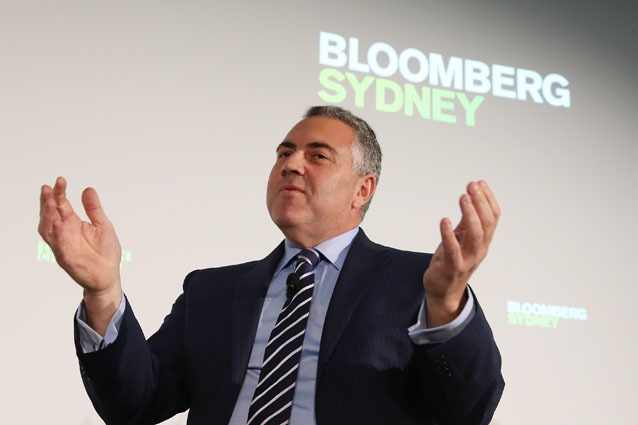Personal Wealth Management / Market Analysis
G-20 Minus One Country Plus 900 Bullet Points = 2 Percentage Points of Extra Growth?
For investors, the G-20's super-secret plan to make the world grow faster is more a sideshow than a reason to be bullish.
Australian finance minister Joe Hockey has one of the greatest last names in politics. He also claims (along with 18 fellow fin-mins) to have the 900-point key to faster global growth. Photo by Bloomberg/Getty Images.
What happens when finance ministers from 19 apparently important economies hang out in Australia for a weekend? For one thing, you get bizarre promises like this: "As of today, we are 90 percent of the way to reaching our 2 percent goal for additional global growth." At least, so says Aussie finance minister Joe Hockey, talking up the 900-plus initiatives he and his cohorts supposedly agreed to in their effort to make the world grow two percentage points faster (annually) over the next five years.[i] But before you start doing the Snoopy dance over the prospect of faster growth, here is a reality check: This is the G-20.[ii] We are darned skeptical that 900-plus measures blessed by the consensus at a political sideshow will do anything to boost growth above and beyond what it already would have done anyway. Don't get us wrong-we think the world is poised to grow faster over the foreseeable future! But this isn't why. All the media attention on this gathering of global economic glitterati is a sideshow for investors.
Our skepticism has nothing to do with the specifics of their plan-largely because no one has any idea what they are. The meeting-a prep session for November's formal G-20 summit-was a closed-door affair, and these 900 bullet points of growthiness are still very hush-hush. The fin-mins did allude to focusing on infrastructure, fiscal and monetary policy, but we are hard-pressed to come up with a few hundred infrastructure-related pledges. Last we checked, you could cover the whole shebang in a single sentence. Like, "We politicians do solemnly swear to build more roads, train tracks, ports, pipelines, power plants, power lines, cell towers, Internets and other related things-oh and to fix potholes and stuff." There are probably some other politically popular things in there too, but we guess we'll just have to wait for the big reveal in November.
So we can't definitively judge whether these 900-something things do, as Hockey said, get them 90% of the way to an extra two percentage points of annual growth by 2018. Nor can we say what might get them the rest of the way there. But we are also pretty sure they can't either, because there is no way to quantify any of this. The assumptions they use for projected growth over the next few years in the status-quo scenario usually rely on fairy-tale straight-line math that ignores basic things like business cycles. Which renders them a useless counterfactual. The two-points-better projection is undoubtedly based on arbitrary assumptions (with more fairy-tale straight-line math!) that ignore the potential for unintended consequences. This is all just fiction, folks.[iii]
The whole exercise is also rather perplexing. Like, these are all politicians, meaning they already have a pretty darned high incentive to do whatever they can to boost their economies. Now whether their approaches make sense is another story entirely, but the notion that a G-20 meeting can goad them into even growthier policies than they'd otherwise do is just mystifying. Ditto for the notion that any of these 900 magical measures might be at all revolutionary. We're talking about the finance ministers from 19 countries with competing self-interests and varied political and economic ideologies. Whatever they can find consensus on, by definition, will be incremental window dressing. Groupthink is rarely radical. The lowest common denominator generally wins.
One thing they could do is take a page from the OECD and try to crack down on tax avoidance globally, in part by pressuring Ireland into raising its corporate tax rate. Which the G-20 may in fact do according to some reports. However, if this makes up any of the G-20's 900 growthy bullet points we'd suggest there is a substantial logic error.
On the bright side, this is all probably totally fine for markets, because the global economy is already growing just fine, thank you. Could the eurozone and Japan grow faster? Sure! But the structural changes that would benefit each of those economies will never come from the G-20. Those have to be decided and passed by their own governments. All you'll get from the G-20 is some urging and finger-pointing and pointed requests for Germany to do something truly revolutionary like import more. Nothing actionable, and nothing that even scratches the surface of what's really needed for these economies to break out of their funks. For instance, we are fairly certain the G-20 will not tell the ECB to go easy on eurozone banks already, because the G-20 are all about strengthening financial regulation and capital requirements, because they are politicians who need to be seen "doing something" about banks. "Back off and let them lend more" is probably not point 403.
Anyway, whether the global economy grows faster isn't really the point for stocks. Faster growth doesn't mean faster stock market-the last five and a half years of bull market have proven stocks can do great alongside a ho-hum economy. Stocks move most on the gap between reality and expectations, and the expectations for growth looking ahead are fairly low. As in "the US and UK look great, shame China, Japan, the eurozone, Brazil, Russia and everyone else are pulling us down." There is a ton of overlooked growth and potential in that preceding sentence, which tells you even a very modest pickup in global growth would be a happy surprise. And with Leading Economic Indexes in the US, UK, eurozone, China and elsewhere in long uptrends-and with yield curves steeper today than they have been for much of this expansion-global growth seems likelier to speed up than slow down.
Stock Market Outlook
Like what you read? Interested in market analysis for your portfolio? Why not download our in-depth analysis of current investing conditions and our forecast for the period ahead. Our latest report looks at key stock market drivers including market, political, and economic factors. Click Here for More!
[i] If you are asking, "faster than what?" we're right there with you.
[ii] Gotcha! They just didn't invite Russia, because Ukraine. Hence the 19.
[iii] This is why folks still argue today over whether 2008's $787 billion stimulus saved the US economy from a worse outcome, wasn't big enough or was the wrong prescription. It's like Choose Your Own (Macroeconomic) Adventure.
If you would like to contact the editors responsible for this article, please message MarketMinder directly.
*The content contained in this article represents only the opinions and viewpoints of the Fisher Investments editorial staff.
Get a weekly roundup of our market insights
Sign up for our weekly e-mail newsletter.

See Our Investment Guides
The world of investing can seem like a giant maze. Fisher Investments has developed several informational and educational guides tackling a variety of investing topics.






